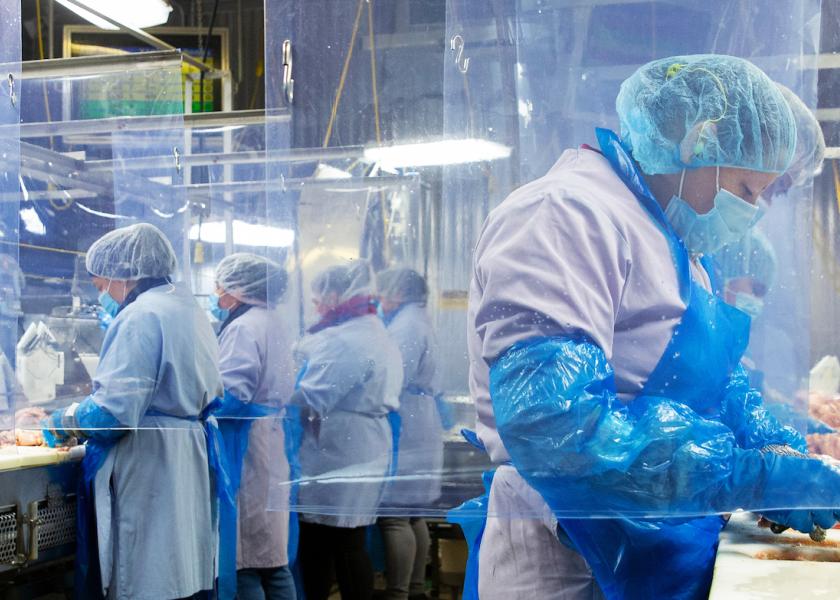Lawsuit Alleges Tyson Managers Wagered On Employee Infections

In a lawsuit filed in Iowa, Tyson Foods managers are alleged to have privately wagered money on the number of workers who would become infected with COVID-19 during the early stages of the pandemic.
The allegations were made in a wrongful death suit tied to infections at Tyson’s Waterloo, Iowa, pork processing plant where employees were ordered to work despite rising infection rates, according to a report in the Iowa Capital Dispatch.
On Thursday, the AP reported Tyson Foods has suspended top officials at the Waterloo facility and launched an investigation into the allegations they bet on workers’ coronavirus infections.
Tyson president and CEO Dean Banks said he was “extremely upset” about the allegations against the managers, saying they do not represent the company’s values. He said the company has retained the law firm Covington & Burling LLP to conduct an investigation, which will be led by former U.S. Attorney General Eric Holder.
“If these claims are confirmed, we’ll take all measures necessary to root out and remove this disturbing behavior from our company,” Banks said in a statement.
Banks said the accused have been suspended without pay. A spokesman for the Arkansas-based company said it would not release their names during the investigation by Holder, who served as attorney general for six years under President Barack Obama.
The family of Isidro Fernandez sued Tyson earlier this year, alleging Fernandez was exposed to COVID-19 while working at the Waterloo plant. The suit alleges Tyson is guilty of a “willful and wanton disregard for workplace safety.”
In a statement issued late Wednesday, Tyson spokesperson Gary Mickelson said the company was “saddened by the loss of any Tyson team member and sympathize with their families.” The company said it would not comment on specific allegations within the lawsuit but that its “top priority is the health and safety of our workers and we’ve implemented a host of protective measures at Waterloo and our other facilities that meet or exceed CDC and OSHA guidance for preventing COCVID-19.”
According to the Black Hawk County Health Department, more than 1,000 workers at the Waterloo facility – more than one-third of its workforce – contracted the virus. Fernandez died April 20 and was one of at least five Waterloo plant employees to die from the virus.
The lawsuit alleges that despite the uncontrolled spread of the virus at the plant, Tyson required its employees to work long hours in cramped conditions without providing the appropriate personal protective equipment and without ensuring workplace-safety measures were followed.
Allegations in the lawsuit include:
- In mid-April, around the time Black Hawk County Sherriff Tony Thompson visited the plant and reported the working conditions there “shook [him] to the core,” the plant manager organized a cash-buy-in, winner-take-all, betting pool for supervisors and managers to wager how many plant employees would test positive for COVID-19.
- One upper-level manager at the plant, is alleged to have explicitly directed supervisors to ignore symptoms of COVID-19, telling them to show up to work even if they were exhibiting symptoms of the virus. The manager reportedly referred to COVID-19 as the “glorified flu” and told workers not to worry about it because “it’s not a big deal” and “everyone is going to get it.” On one occasion, the manager intercepted a sick supervisor who was on his way to be tested and ordered him to get back to work, saying, “We all have symptoms — you have a job to do.” After one employee vomited on the production line, managers reportedly allowed the man to continue working and then return to work the next day.
- In late March or early April, as the pandemic spread across Iowa, managers at the Waterloo plant reportedly began avoiding the plant floor for fear of contracting the virus. As a result, they increasingly delegated managerial authority and responsibilities to low-level supervisors who had no management training or experience. The supervisors did not require truck drivers and subcontractors to have their temperatures checked before entering the plant.
- In March and April, plant supervisors falsely denied the existence of any confirmed cases or positive tests for COVID-19 within the plant, and allegedly told workers they had a responsibility to keep working to ensure Americans didn’t go hungry as the result of a shutdown.
- Tyson paid out $500 “thank you bonuses” to employees who turned up for every scheduled shift for three months — a policy decision that allegedly incentivized sick workers to continue reporting for work.
- Tyson executives allegedly lobbied Iowa Gov. Kim Reynolds for COVID-19 liability protections that would shield the company from lawsuits, and successfully lobbied the governor to declare that only the state government, not local governments, had the authority to close businesses in response to the pandemic.
In previous court filings, Tyson has said it “vigorously disputes” the plaintiff’s claims and has “invested millions of dollars to provide employees with safety and risk-mitigation equipment.”
The lawsuit is seeking unspecified damages for fraudulent misrepresentation and gross negligence.
The case was initially filed in state court, claiming violations of Iowa law. At Tyson’s request, the case was moved to federal court, with the company claiming it had remained open during the pandemic “at the direction of a federal officer” — President Donald Trump, who, on April 28, invoked his authority under the Defense Production Act and ordered meat and poultry processing companies to continue operating.
The Waterloo facility is Tyson’s largest pork plant in the United States. The facility employs approximately 2,800 workers who process approximately 19,500 hogs per day.







